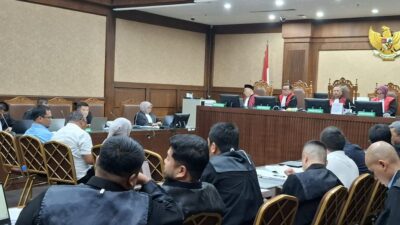lembaranbaru.my.id – Iwan was in a state of panic when a phone call over the weekend brought bad news. The call came from a loyal customer of Iwan’s convection business. The caller admitted planning to cancel a bulk order that had been agreed upon to continue until the Hari Raya Idulfitri in 2025. The customer was worried that Iwan’s convection services would become more expensive due to the 12 percent Value Added Tax (VAT) policy next year.
The 27-year-old man, who runs a small-scale convection business, or Micro, Small, and Medium Enterprises (MSMEs), admitted that he had to brainstorm to calm his customers’ concerns. Iwan is now trying various ways to convince some customers who have started to consider canceling or reducing their orders. Especially, he said, customers who had already agreed to collaborate until next year.
“I definitely told them that the option to increase the unit selling price is not yet there. Maybe we can switch to cheaper raw materials, but of course, the price will adjust, it’s a bit of a headache,” Iwan said when met by Tirto at a coffee shop in Tanah Sereal, Bogor City, on Thursday (11/21/2024).
For the past three years, Iwan has been trying his hand at the convection business. Iwan usually receives orders to make uniforms and jackets for students or the industrial sector. Lately, Iwan said some of his customers have expressed concerns about the government’s policy to set the VAT rate at 12 percent starting in 2025.
According to Iwan, they are worried that the orders that have been made will experience a price adjustment due to the 12 percent VAT. Customers are not prepared for a sudden increase in purchasing prices. Iwan himself is worried that the government’s policy next year will shake the business he is trying to build.
“Certainly, there will be adjustments to the prices for raw materials of all kinds. We just have to accept it as ordinary citizens,” Iwan said with a chuckle.
The same concerns were also expressed by Ian, a home restaurant entrepreneur. The trader from Bogor Regency is worried that the 12 percent VAT rate will affect the number of customers who are increasingly refraining from shopping. Ian said that recently his home restaurant business has been experiencing a decline in customers.
“If you look at social media, people are becoming more frugal because prices are high. I’m afraid that for businesses like this [MSMEs] that are generally the second choice for people, they will be left behind,” said the 33-year-old man over the phone.
So far, according to Ian, the only concern is the decreasing number of customers in the MSME sector. As for raw material prices, Ian does not feel too afraid because food prices have not experienced significant increases. Ian himself finds it difficult to push promotions or lower menu prices at his restaurant.
“Lowering prices makes sense if we want to survive, but does the government guarantee that people like us will continue to get customers? Don’t burden everything on the ‘little people’ too,” Ian complained.
The Ministry of Finance will begin implementing a 12 percent VAT rate at the beginning of 2025. This adjustment is in accordance with the decision stipulated in Article 7 Paragraph (1) letter b of Law Number 7 of 2021 concerning Tax Regulation Harmonization (HPP Law). It is stated that the 12 percent VAT rate will come into effect no later than January 1, 2025. The government is still determined to raise the VAT rate despite the repeated protests from the people.
The worries and complaints from MSME players are being received daily by the Chairman of the Association of Micro, Small, and Medium Enterprises (UMKM), Hermawati Setyorini. She expressed sadness hearing the cries of MSME players who are afraid that their businesses will become quieter due to the 12 percent VAT policy. Hermawati believes that the increase in the VAT rate from 11 percent to 12 percent will certainly affect the income of MSME players.
“They haven’t even been hit by competition from imported products that are impossible to catch up with. Not to mention raw materials in Indonesia, although available, are quite expensive. This is like a chain that cannot be connected by the government,” Hermawati said when contacted by Tirto on Thursday.
She believes that the government’s policy is not wise because it neglects to consider its impact on the general public. The government seems to rely solely on state revenue from taxes imposed on the people. The 12 percent VAT rate seems to only target consumers. However, Hermawati says that behind it, many traders and MSME players are struggling because of this policy.
MSME players feel squeezed: if they raise prices, customers will decrease. On the other hand, cutting prices will eat into their production costs and income. Hermawati asks the government to postpone the 12 percent VAT rate policy next year until the situation of people’s purchasing power stabilizes.
Based on data from PricewaterhouseCoopers (PwC), a 12 percent VAT rate will place us at the top of ASEAN countries with the highest VAT taxes. Currently, the Philippines is the highest with a 12 percent VAT rate. Indonesia is in second place with an 11 percent VAT rate. Below, there are Cambodia and Vietnam, both imposing a 10 percent VAT rate. Furthermore, Singapore applies a 9 percent VAT rate. While Malaysia sets a 8 and 10 percent VAT rate depending on the type of tax.

Wiser to be Canceled
Economist from the Center of Economic and Law Studies (Celios), Nailul Huda, believes that Finance Minister Sri Mulyani had stated that the VAT would increase to 12 percent next year based on Law Number 7/2021 concerning Tax Regulation Harmonization (HPP). However, Huda said that in addition to the provision regarding the increase in the VAT rate to 12 percent, there are Articles 7 numbers (3) and (4) that give the government the authority to set the VAT rate in the range of 5 percent to 15 percent through Government Regulations.
“This point also refutes Sri Mulyani’s claim that she is ‘only’ following the law. There is still an opportunity for the government to help the people so they are not burdened,” Huda told Tirto on Thursday.
Huda believes that this heavy burden comes from the weakening of people’s purchasing power. Household consumption growth slowed down in the third quarter of 2024, with household consumption growth at only 4.91 percent (y-o-y). Meanwhile, on a q-to-q basis, household consumption decreased by -0.48 percent. Indonesia also experienced deflation for five consecutive months (May-September).
Huda mentioned that MSME players have seen their revenue drop by up to 60 percent according to BRI data.
Kenaikan Tarif PPN dan Dampaknya Bagi Sektor UMKM di Indonesia
1. Pengenalan
Di tengah situasi ekonomi yang tidak menentu akibat pandemi COVID-19, rencana kenaikan tarif PPN menjadi 12 persen di tahun 2025 telah menimbulkan kekhawatiran bagi sektor Usaha Mikro, Kecil, dan Menengah (UMKM) di Indonesia. Dampak dari kenaikan tarif PPN ini diprediksi akan semakin memperparah penurunan pendapatan UMKM, yang telah terdampak oleh perlambatan pertumbuhan konsumsi rumah tangga hingga 1,6 persen.
2. Analisis Dampak Kenaikan Tarif PPN
Meskipun tarif PPN Indonesia saat ini sebesar 11 persen masih lebih tinggi dibandingkan negara-negara ASEAN lainnya dan negara-negara OECD, kenaikan tarif PPN menjadi 12 persen dapat memberikan dampak yang signifikan terutama bagi UMKM. Menurut Huda, ahli ekonomi, potensi perlambatan pertumbuhan produksi UMKM bisa mencapai 2 persen jika kenaikan tarif PPN tersebut diterapkan.
3. Perspektif Ekonomi dan Sosial
Direktur riset dari Bright Institute, Muhammad Andri Perdana, menilai bahwa kenaikan tarif PPN dalam situasi ekonomi saat ini adalah tindakan yang berani namun juga berisiko. Menurutnya, tarif PPN yang regresif dapat menjadi beban berat bagi masyarakat kelas menengah dan bawah, sementara kelompok kelas atas cenderung tidak terlalu terpengaruh. Hal ini dapat menyebabkan penurunan konsumsi dan tabungan bagi masyarakat yang pendapatannya pas-pasan.
4. Perlindungan Terhadap UMKM
Ekonom Center of Reform on Economics (CORE) Indonesia, Yusuf Rendy Manilet, menekankan perlunya langkah-langkah strategis untuk melindungi UMKM dari dampak kenaikan tarif PPN. Salah satu solusi adalah memberikan insentif fiskal khusus, seperti pengurangan tarif pajak penghasilan bagi UMKM atau subsidi bahan baku utama. Penguatan akses pembiayaan dengan bunga rendah juga dianggap penting untuk membantu UMKM beradaptasi dengan kondisi ekonomi baru.
5. Kebijakan Pemerintah dan Alternatif Solusi
Kepala Biro Komunikasi dan Layanan Informasi Kementerian Keuangan, Deni Surjantoro, menyatakan bahwa kenaikan tarif PPN telah melalui pembahasan mendalam antara pemerintah dan DPR RI. Namun, sejumlah ahli ekonomi menilai bahwa pemerintah perlu mempertimbangkan kembali kebijakan ini dan mencari solusi alternatif yang lebih bijak, seperti mengevaluasi potensi pajak dari kelas atas yang selama ini belum dimanfaatkan secara optimal.
6. Kesimpulan
Dampak kenaikan tarif PPN menjadi 12 persen bagi sektor UMKM di Indonesia merupakan isu yang perlu mendapat perhatian serius. Perlindungan terhadap UMKM dan kebijakan yang berpihak pada kelompok masyarakat menengah dan bawah menjadi kunci dalam menjaga stabilitas ekonomi dan memperkuat daya beli masyarakat. Pemerintah perlu mengambil langkah-langkah strategis yang tepat guna mengatasi tantangan ini dan memastikan keberlanjutan pertumbuhan ekonomi yang inklusif.












